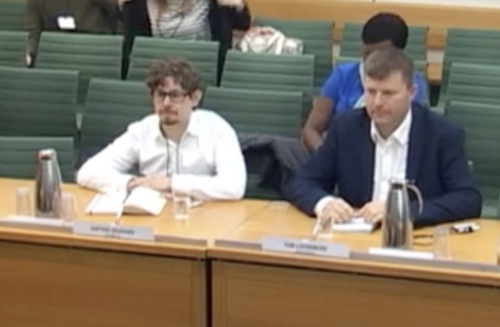
While everyone else was watching that other committee today, I was giving evidence to a less glamorous but equally important committee about digital government alongside Tom Loosemore.
The hour long question and answer session covered a wide range of topics from the aspirations behind setting up the Government Digital Service (GDS), to the challenges government faces in ‘doing digital’ well.
Government still has many challenges ahead to continue delivering good services to users and to meet their increasing expectations.
The initial wave of change that lead to the creation of GDS was able to gain a lot of momentum. It was backed by senior politicians who gave us the space and mandate to get things done. We didn’t do everything right – that was never going to happen – but it was a huge step forward.
We started building good digital services like Lasting Power of Attorney and we started to tackle some of the crippling legacy technology and contracts that existed, like those at the DVLA.
But what comes next, is much more difficult.
And to get there, it’s going to require some fundamental changes to the operation and structure of government.
Tackling the legacy ticking time bomb
Legacy technology is a huge and complex problem, wrapped up in huge and complex contracts. It’s a massive blocker to the delivering good services and it’s only going to get worse. These old systems need to be replaced, the contracts disaggregated and the way they’re funded changed.
Fund teams not projects
It’s no good funding large up-front capital expenditure based on a 5 or 10 year business case – these are full of false certainty and don’t match reality. Government needs to fund teams and focus on ongoing iterative development. Without this, we’re just building a similar problem for the next decade.
Crossing departmental boundaries
Delivering good services often requires crossing the existing departmental boundaries – for example, growing a small business and starting to hire employees crosses 5 different bits of government. It’s complex and difficult. Dealing with this properly is going to take a complete and fundamental change in the way government is structured.
Breaking up departmental silos, and moving to empowered, multidisciplinary teams based around services is the only way to provide the right accountability and ownership to make government simple and accessible to citizens.
Building capability and skills in government
Whether you’re building or buying systems, you need people who understand technology to help you make the right choices. You need people to understand how to put the right contracts and commercial models in place. There is still a huge skills gap here – both on the tech and commercial sides.
Developing an open and inclusive culture
To get the right skills, you need the right culture that supports them and encourages them to join government over large and exciting new tech firms like Google and Monzo. That means openness and transparency, acceptance of mistakes, providing the right tools, empowering teams, devolving decision making.
Buying the right things
Government can’t, and shouldn’t, do everything itself – it’s always going to be reliant on support from industry providing products and services. To do this, it needs to be able to buy the right things easily.
The Digital Marketplace has made incredible strides forward in opening up to SMEs to sell their services, but there’s much more to do. Government needs to get better at buying the right things, and structuring what it wants in a way that supports and encourages SMEs.
Building a strong centre (with teeth)
To do all these things, government needs a strong centre to set and enforce standards. That means strong and constructive spend controls and agreeing open standards. But it also needs a strong centre to provide support out to the rest of government.
The positives
There are so many positives in government digital at the moment. The digital teams at MOJ have built some fantastic services and are starting the hard work of tackling legacy technology. Other teams across many departments, including Department for Education, Defra, Land Registry, DVSA are working hard to provide good services. A Permanent Secretary talking openly about user-centred approaches is a huge step forward.
What digital government needs now is a vision for what comes next, good leadership and support from the very top of the civil service.
If you want to watch the full evidence session, it’s available on the Parliament.TV website.